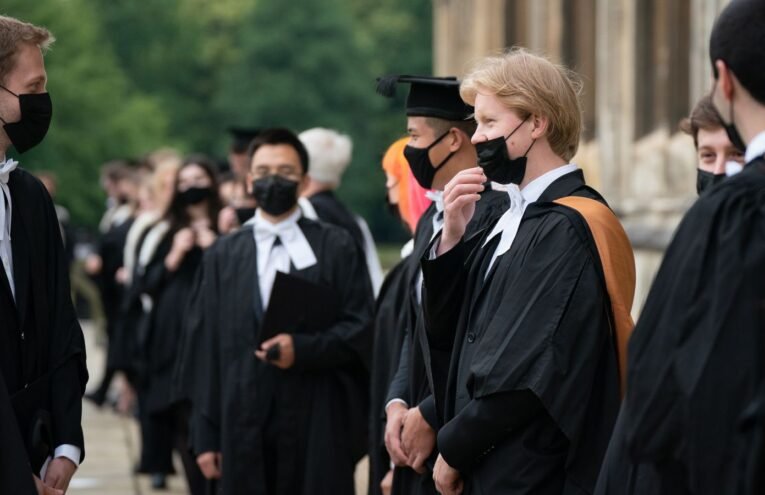LD Events Conference – 9th May – A Retrospective View Article Creating a ResLife Programme for Key View Article Three rules of work, two DBFOs, and a footbridge View Article Reflections on the LD Events Student Housing Conference 2022 View Article How has COVID shaped the students of 21/22 – Creating a post-COVID Programme View Article Reflections on 2021 for the UK PBSA Sector and Student First Group View Article Should I Stay or Should I Go? View Article Between a Rock and a Heard Place – Operating in the time of Corona View Article Virtual Adaptation during COVID-19: Who has done what well? View Article Building Virtual Res Life Communities: Digital Natives do not Exist View Article COVID-19, PBSA and sending students ‘home’. View Article Transitioning to University in the UK – How PBSA Providers can play their part View Article
The 2022/23 academic year saw a surge in the need for Purpose-Built Student Accommodation (PBSA) in the UK, in the aftermath of the pandemic years. We took a snapshot of the availability of PBSA across the country on 2 October 2023 to ask: one year later, how easy or difficult is it for students to find accommodation at this point in the cycle? SFG partners with Student Crowd who collates data with 100% coverage of UK PBSA.
Interview with Richard Gabelich- Founder & CEO Student First Group Thursday Jun 20, 2019 On our latest episode Nick explores a specialised area of student housing gaining in popularity in the sector and that is Design, Build, Finance and Operate or DBFO partnership schemes as they are more commonly known. Under DBFO schemes a student housing partner typically takes a long lease of university-owned land, designs a scheme in conjunction with the university, raises finance, builds it, operates it and takes the risk of finding occupants. In return, the university receives a capital receipt, the expertise of a dedicated partner and continued influence over creating a high-quality student experience. We welcome on the episode Richard Gabelich of the Student First Group to explore this complex deal area. Student First provide innovative student accommodation advisory, investment, development and asset management solutions to developers, investors, universities and operators. Visit Podcast Lorem Ipsum is simply dumy text of the printing typesetting industry lorem ipsum.
Interview with Rebecca O’Hare- Head of Partnerships & Resident Experience at SFG Thursday Oct 10, 2019 On this latest episode we look at Reslife, which is very timely with a new intake of student residents arriving across the country for this year’s academic intake. We welcome on Rebecca O’Hare to share her expertise in the sector. With over a decade of experience in the student accommodation market, Rebecca has recently embarked on a new venture with Student First Group as their Head of Partnerships and Resident Experience. Visit Podcast Lorem Ipsum is simply dumy text of the printing typesetting industry lorem ipsum.
How do you view the partnerships between universities and accommodation providers?
This is our latest report on an ever-growing investment sector involving partnerships between universities, developers, investors and operators to create new or refurbished student housing. In the first research publication of this kind since 2018, we examine Design, Build, Finance and Operate (DBFO) structures, as well as income strips. We ask: how has this sector grown? Who is active in the market? What is the pipeline of projects? What are the current challenges? And – what might the future hold?
Student First Group (SFG) and CBRE jointly ran a seminar in late 2022, bringing together developers, operators and universities to ask this question. London is still experiencing a bottleneck in Purpose-Built Student Accommodation (PBSA): supply is falling behind demand from students across the UK and across the world who are drawn to London as one of the top international destinations for Higher Education. SFG has been building a profile of university requirements, actively matching supply with demand, and introducing universities to potential developments with a good fit. In this report, we summarise the points that we made in the seminar and distil the ideas brought to the table by the attendees, all of whom had first-hand experience of grappling with the issues.
UK-based advisor and asset management firm SF Investment Management has overseen the three-year rehabilitation of a 200-year-old historic building in Lisbon and subsequent lease agreement between The Inditex Group and Rossio Pombalino S.A. Since February 2018, Rossio Pombalino S.A. has invested over €100 million in the acquisition and rehabilitation of this flagship building and Lisbon landmark, which included repair and strengthening of original pombaline walls and staircases, a completely new roof, repainted frescos, recreated stucco ceilings, repaired original fixtures and the restoration by hand of over 20,000 original azulejo tiles from the 18th century. The company is 100% owned by an international family office who hold this asset as part of a diversified portfolio of financial investments and real estate ventures. Rossio Pombalino represents the Inditex Group’s new strategy of larger flagship physical stores, providing a unique experience to store visitors and customers, containing the full range of its collections and accompanying with better logistics and technology. Richard Gabelich, co-manager of the development and CEO of SF Investment Management who advises the owner: “We are very pleased with the agreement with the Inditex Group, managing to maintain the balance between the modern future, represented by the brand of an international fashion retail leader and which has a privileged operational relationship with Iberia, and maintaining the Pombaline characteristics that we jointly wanted to preserve. This is an excellent opportunity for Zara to come and energise the most noble area in the heart of the city of Lisbon and brings a world class long term partner appropriate to the super prime nature of the location” The project involved a broad and careful rehabilitation operation of one of the most well-known spaces in Lisbon, once partially occupied by Pastelaria Suiça. This has resulted in an exemplary initiative to safeguard the heritage, creating conditions for the installation of a modern store and adapted to the current time, but preserving the identity and all the architectural elements relevant to the existing construction. In keeping with this sympathetic restoration, Richard Gabelich adds: “The historic tea and coffee shop ‘Pérola do Rossio’ remains as an integral part of ‘Rossio Pombalino’, under the management of the original family who celebrated 100 years in 2023 and ensuring the preservation of the historical memory of the building.” The rehabilitation of the building has maintained other key historically significant elements of architectural and patrimonial value such as the historic store ‘Manteigaria União’. It is this mixture of architectural and commercial elements that give the recreated space the mark of a contemporary intervention.
Last week, the 11th Annual LD Events Virtual Student Housing Conference took place and the sector gathered to discuss numerous topics which largely focused on recognising the impact of COVID-19 on the world of Student Accommodation including the importance of student wellbeing during these challenging times. As we are all too aware, the Higher Education headlines are changing at such pace, even the most observant amongst us are struggling to keep up. As predicted at the conference, recent media captions depict dissatisfied students struggling with online teaching approaches, feeling isolated in their halls, and questioning their decision to attend university in 2020. We have gathered some key points from the conference discussing them below as they may ring true in the future. International Students International students have always been an essential part of the student housing sector, with many universities becoming more financially reliant on them choosing to study at their institution. PBSA developers, particularly in London, have often focused building more higher-end luxury properties specifically to house this cohort believing them to have greater means to support a more affluent way of living. Online booking/travel agencies have consistently reported a higher rate of PBSA bookings from international students compared to their domestic counterparts. However, a number of challenges, including VISA application complications, financial issues and physically being unable to get out of their country have arisen. As a result, the sector is eagerly anticipating whether these students will arrive and check into their accommodation (regardless of whether a booking was made). There are investors and operators in the sector who argue they do not have an over reliance on international student revenue but we are likely to see how accurate that proves when the data is gathered later this year. Regardless, a diversified portfolio and ability to pivot to domestic or even non-student market if there is less international demand will come under the spotlight. Student Demand for PBSA Over 25 PBSA transactions took place worldwide between April and August 2020 and there is no strong evidence to suggest the student housing market will decline anytime soon. Over the next decade, a demographic change is on the UK horizon bringing with it the prospect of several tens of thousands more 18-year olds applying to university which the industry holds out as a panacea to longer term demand and supply concerns. Responding to the student voice over the argument of continuing to pay rent during the early stages of the pandemic, several operators chose to follow in the footsteps of Unite Students and universities and issue refunds. Interestingly, Unite chose to categorise this decision as an investment in their brand. As Unite control and operate all of their own beds this was an easier decision for them compared to some of the operators who manage for several different investors who could not so easily follow suit. As a result, many have faced significant criticism from students when compared against the Unite response. The response has highlighted to students and investors the maturity of operators and their improved focus and understanding of the needs and experience of students. Demonstrating that unlike HMO’s, PBSA’s are more flexible and have the ability to amend contracts if and when necessary. Approaching this academic year, there is a sense that students expect a higher level of consideration from PBSA’s to amend contracts to fit in with their circumstances should they swiftly change. When opting to release students early from contracts, operators need to balance their own requirements with those which may negatively affect their residents (e.g. mental wellbeing and family financial hardships). We ponder whether bespoke contracts will become the ‘norm’ in future years as the market is potentially forced to adapt to housing students who may not necessarily require student accommodation when the majority of their learning will take place online? In addition, PBSA appears to be favoured over university halls. StudentCrowd reported PBSA surpasses university halls when competing against the things students most value when selecting their accommodation. The data outlined a 5% decrease in students researching university halls in 2019/20 compared to a 27% increase for private accommodation searches in same year.
The reported decline of student mental health and wellbeing has not gone unnoticed in recent years. Streams of reports documenting higher rates of mental health illness amongst students than those reported to universities have emerged. It is frequently suggested that student mental health is in ‘crisis’ and factors including moving away from home, academic pressures and financial worries all contribute to exacerbating the issue. Demands on counselling services have increased and some argue, the welcomed reduced stigma around mental health has contributed to the rise in students disclosing their issues and concerns. As a result, PBSA operators have placed increased focus on the potential role they can play in campaigning for and improving student mental health. A number have increased funding and resource to student experience programming, aiming to enhance community relations. Others have engaged in and published research, discussed it at conferences and called on the sector to improve their staff training and signposting strategies. While smaller operators with modest budgets have chosen to implement more subtle changes to their operations as and when they can, often relying on publications from larger PBSA operators to guide them in their work. An Increasingly Diverse Cohort Full time course enrolments have increased by over 20% in ten years, with international student numbers doubling in the last twenty. Despite Brexit fears, the UK is still a desirable place to study with nearly a fifth of applications in 2019 coming from outside the UK and long-term growth from international students forecast to continue up to 2030. As a result, the student body is more diverse than ever and as international students continue to choose PBSA over university owned accommodation, the demographic of our residences will continue to be culturally diverse. Welcome news for all, however a more diverse cohort can bring with it a variety of mental health and wellbeing issues for PBSA teams to mitigate. Published Guidance Published research and guidance from the British Property Federation, Student Minds and Universities UK, outline the important role accommodation plays in the wider student experience. However, the research has now moved beyond acknowledging accommodation as an important factor to one which now includes best practice methods for PBSA operators to improve their day to day operations and overall support offering to their residents. The student wellbeing report from the British Property Federation as an example outlines minimum reactive wellbeing policies and useful proactive measures. It includes a self-assessment tool to aid providers in identifying gaps in their operational procedures and helps them gather and utilise data in order to develop clear and tangible action plans. PBSA operators are utilising these publications to implement positive change and improve awareness and support for student mental health. However, it is our belief future research will adopt a lens of intersectionality and resulting strategies will require PBSA operators to design more appropriate and bespoke strategies in order to engage more specific student groups. Intersectionality Explained Current recommendations within the sector often allocate students into neat boxes. They are first years. Male, female or prefer not to say. International or domestic. Most published research available, as an example can inform us specifically about the happiness levels of first year female students from the UK. However, how does their wellbeing differ if they are part of the LGBTQ+ international community? Or if they are part of the BAME (Black, Asian, Minority, Ethnic) cohort? Or studying part time? Or all the above? Student Minds have commenced conversations in this area by publishing in the area of LGBTQ+ mental health and graduate wellbeing, however a paucity of research and recommendations continues to exist within the UK which places student mental health within an intersectionality framework. What does it mean for PBSA? From an operational standpoint, research in this area may propose new forms of staff training, revised escalation procedures and improved signposting measures. Altering mental health activities to ensure they are more inclusive may become the remit of those keen to build upon their student experience offering. When executed well, ad-hoc wellbeing events will always valuable but how can we ensure the information shared reaches all who may need it? Perhaps a focus on student wellbeing is intertwined amongst PRIDE week or Chinese New Year festivities or improved collaboration with universities to delivering their student mental health objectives becomes the norm? However the conversation on student mental health evolves, the role of PBSA operators in supporting student wellbeing will continue to be crucial.








